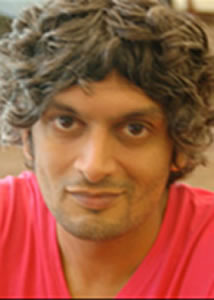De Amerikaanse dichter, schrijver en essayist Kazim Ali werd geboren op 6 april 1971 in Croydon, Engeland. Hij behaalde zijn Bachelor of Arts (1993) en Master of Arts (1995) in Albany (NY) en zijn Master of Fine Arts aan de New York University in 2001.KazimisAliisde schrijver vantwee bundels poëzie,The Far Mosque (2005) enThe Fortieth Day (2008). Als vertalerpubliceerde hijWater’s Footfall doorSohrabSepehri(2011).Verder schreef hij de romansQuinn’s Passage (2005) en The Disappearance of Seth (2009),BrightFelon: Autobiography and Cities (2009) en Orange Alert: Essays on Poetry, Art and the Architecture of Silence (2010), enFasting for Ramadan,2011.Hij isassistent-professorCreativeWritingaan het OberlinCollege endoceert aan deUniversity of SouthernMaine.Zijn werk isin veletijdschriften, zoals Best American Poetry 2007, American Poetry Review en de Boston Review gepubliceerd. Daarnaast is hij medeoprichter van uitgeverij Nightboat Books.
Uit: The Disappearance of Seth
„A week after the Manhattan sky revised itself and he had to abandon work on the building he was redesigning, a building that was now underneath tons of debris and ash, Saif meets Zel in a cafe near Washington Square, the air washing its hands with the thick quilt of ash, scraps of paper, dirt, a glittering net that billows.
Flesh leaking into me. A person casts themselves into the sky and dissolves. A theory Saif remembers reading about: that a person falling from a great height dies before hitting the ground: scares himself to death.
Unproveable.
Or the soul is like smoke. Likes that idea. A person casts himself into the clouds and the soul disperses. Maybe the soul is like water and once in the air, the soul can condense on any available surface, like a window, or a drinking glass.
Can rain down again into him.
The night can rain down again into him.
A night raining orange and ruin. The blue day cut with it.
He was like that: drinking the air and letting it burn his inside.
Zel doesn’t think it could happen like that. “They didn’t jump, Saif. I read in the paper that it was the change in air pressure due to the burning jet fuel. The windows were blown out and the people were pulled from the building into the air.”
Saif thnks two things at once, grotesque and sublime: first Gibreel and Saladin, falling from Rushdie’s airplane: bits of ash from the end of a cigar; and then: how strange that the sky pulled the people into itself.
Is he still human that he can think poetically about monstrosity?”

Kazim Ali (Croydon, 6 april 1971)
